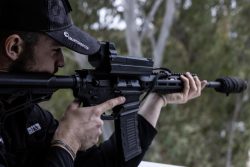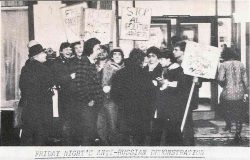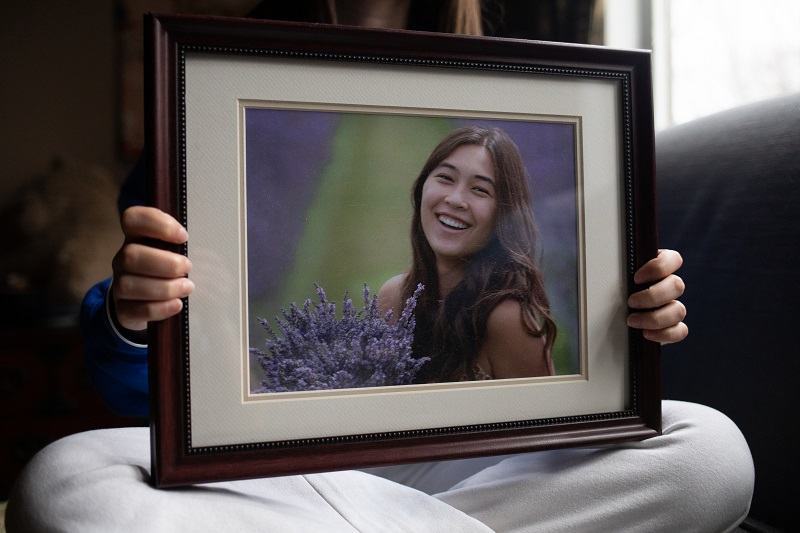
Reina St. Juliana, 16, holds a picture of her sister, Hana, who was one of four teens killed Nov. 30 in a shooting at Oxford High School in Michigan.
15:53 JST, May 19, 2022
OXFORD, Mich. – She’d rarely left the house in the four months since the shooting, but on the first warm day of spring, 16-year-old Reina St. Juliana slid her lacrosse backpack over her shoulders, said goodbye to her parents and stepped out the front door.
It was 4:30 p.m. on a Monday in mid-March, and her friend Olivia Curtis, also 16, idled in her SUV in the long driveway. Reina got into the passenger seat and shoved her lacrosse stick at her feet.
They began driving to Oxford High School, the place where Reina had lost so much.
“I don’t think I was nervous until now,” she said.
“I actually wasn’t going to come today,” Olivia replied. “I cried the whole morning. My mom was like, ‘Go to tryouts, and if you don’t want to play, then quit.’ “
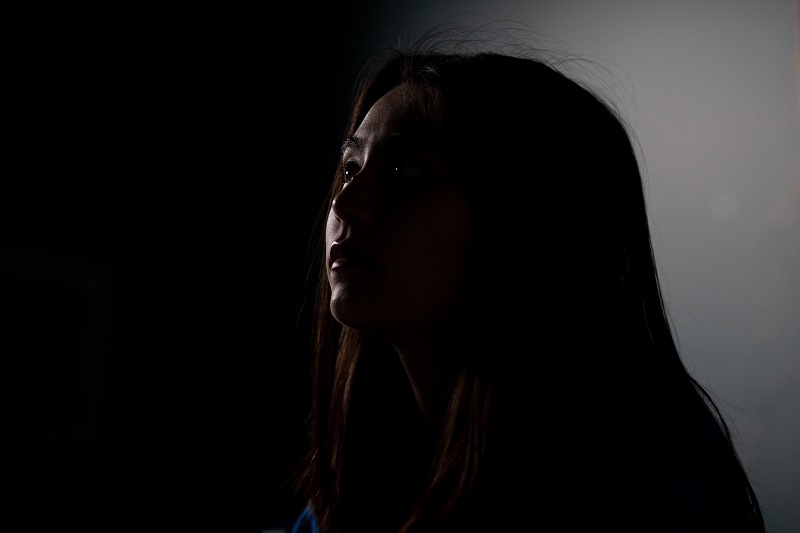
“You don’t get to forget her just because remembering is hard,” Reina St. Juliana, 16, says she often thinks as she navigates her grief and anger at her school over her sister, Hana’s, slaying.
Reina didn’t let herself cry very often, not even when she spoke at the funeral for her 14-year-old sister, Hana – one of four teens killed Nov. 30 at Oxford High in the deadliest school shooting since the 2018 massacre at Marjory Stoneman Douglas High in Parkland, Fla.
Reina’s anger eclipsed her grief.
Olivia paused at the intersection near the neighborhood bus stop, where a Norway spruce topped with a big silver star was planted in honor of Hana, who’d loved Christmas.
Reina was acutely aware of her absence, especially on this day. They’d planned to make Oxford’s varsity lacrosse team together, even picking out the jersey numbers they’d wear: 12 for Hana and 14 for Reina.
But now Reina was here and Hana was not. She felt the cruelty of that so much that she’d nearly skipped lacrosse season. Then, just before the tryouts were set to begin, she changed her mind. She’d do it.
The SUV’s turn signal clicked.
“I don’t even know who’ll be there,” Reina said.
She watched the electrical lines rise and fall outside her window, the blue village water tower appearing on the horizon. They passed Meijer, the grocery store where Reina had learned of Hana’s death, and turned at the sign for Oxford High, where a memorial for the victims with white crosses, teddy bears and holiday wreaths had stood for six weeks before it was taken down.
Its removal had become a source of smoldering resentment for Reina.
School administrators had been accused in lawsuits filed by Oxford parents of ignoring red flags about the boy charged in the shooting – allegations they’ve repeatedly denied. Reina’s father was considering legal action, too.
Meanwhile, Reina kept pressing the principal and other officials – who did not respond to repeated requests for interviews – to put a temporary memorial inside the school until a permanent one could be built. So far, it hadn’t happened, leaving little to indicate that Hana had ever been a student at Oxford High.

The St. Juliana family, Steve, Ai, Reina, Hana, Noa and their dog, Finn, take a photo in front of their Christmas tree on Nov. 27, three days before the shooting.
You don’t get to forget her just because remembering is hard, Reina often fumed. My family doesn’t get that privilege.
Olivia parked the SUV outside the familiar building of tan brick and glass. Half of Reina’s friends had decided to return to Oxford for the spring semester, but Reina was taking her six classes online. There was no way she could watch her classmates talk and laugh in the hallway where Hana was killed.
“Water, goggles, stick, cleats,” Reina said, slamming the car door. “I have a feeling that I’m missing something.”
They walked across the lot and descended the metal bleachers to the football field. Soccer players clomped by in their cleats. Reina propped her backpack – dark cloth amid the clear plastic ones that the school now required – against the fence.
“I can’t believe you’re here!” one girl shrieked.
“Oh my gosh, hey!” said another classmate, in unison with a friend. “Reina’s here!”
They complimented her shorter haircut and pierced ears, changes she’d made a while ago. Most of them hadn’t seen her in months.
Reina knew that other kids didn’t always know what to say to her. To avoid making her uncomfortable, they often didn’t bring up Hana at all, even though she was the only thing Reina wanted to talk about.
Head coach Trevor Marshall shouted for each grade to separate by jersey color. Reina, who’d played junior varsity the previous spring, pulled a gray one over her baggy pink sweatshirt, then pinned on a paper number: 45. Standing with the other juniors, she noticed that the line of freshmen, where Hana should have been, was in yellow.
On the turf, the girls circled the coach, who’d promised to remember Hana in a way that Reina felt the school was refusing to do. The players would wear silicone wristbands with her initials, HSJ, and a patch of a flower – the Japanese translation of her name, which was pronounced Hah-nuh – on their jerseys.

A jersey in honor of Hana St. Juliana, with a patch designed by her family, rests on a fence during the Oxford girls lacrosse game at Royal Oak High. The coach and the team are remembering Hana by wearing the jerseys and wristbands
Reina joined her teammates for warm-ups, dark ponytail whipping from side to side as she jumped and kicked. She knew what came next and dreaded it.
She played midfield, the fastest position on the team. One of the last times she’d run, though, had been the day gunfire erupted, when she’d sprinted the mile from her fifth-period SAT prep class to the safety of Meijer, where she’d waited in the pharmacy – amid bottles of painkillers and multivitamins – for news of her sister. She’d lost 11 pounds since then and hadn’t been practicing.
Marshall announced that the timed mile was about to begin. At his signal, a cluster of girls leaped across the starting line. For two laps, Reina held pace with the quickest runners, but by the third, she had slowed to a walk.
She wanted to go home. She hated overhearing everyone else’s conversations, their lives seemingly back to normal again.
But if Reina left now, she knew that she’d never return.
“I’m dying,” Reina told Olivia.
“Yeah, me too.”
They rounded the last bend in the track. Overhead, geese wedged the pale sky as they migrated north.
“Almost done,” the coach shouted. “C’mon, you’re so close!”
Reina’s legs moved faster.
She would make the team for Hana – even if it meant donning a uniform emblazoned with Oxford High across the front.
***
On their last day together, they’d gotten bored in class and texted about meeting up.
It was fourth period. Reina was in physics. Hana was in a college prep class. Both girls asked to use the bathroom.
Then they walked empty hallways – that would soon resound with gunshots – gossiping and laughing. Hana had worn her pink Converse sneakers and green pants, which Reina had attempted to steal the night before. After Hana had caught her, she’d promised that Reina could wear them later in the week.
The sisters shared clothes, a friend group, a sarcastic sense of humor and a second language: Japanese. Their father, Steve, was from Michigan’s Upper Peninsula. Their mother, Ai, had grown up in Yokohama, Japan. Though the girls were born north of Detroit, their family had spent 2 1/2 years in Tokyo, where their 10-year-old brother, Noa, was born.
The siblings spent every other summer with their grandparents in Fukuoka. At home, they spoke and texted in Japanese. Reina and Hana liked speaking the language at school, too, so that their teachers couldn’t eavesdrop on them.
The girls were loud and chatty, sometimes finishing each other’s sentences. But while Reina was always in trouble for talking in class, Hana’s timing was better. She got away with more.
They were rivals as well as sisters. When Ai told Hana that she’d make an exception to the family rule and allow her to pierce her ears before her 16th birthday if Reina agreed, Reina said no. Hana would have to wait like she did.
And Hana’s growth spurt – she was about 5-foot-7 – was a constant annoyance to Reina. When they’d jump to reach the high beam in their kitchen, Hana’s fingertips always touched. Reina, at 5-4, missed half the time.
In photos – at the sunflower fields west of their home or the deep blue waters of Kitch-iti-kipi in the Upper Peninsula – Reina would stand on her tiptoes or drape an arm over Hana’s shoulder to make herself appear slightly taller. In an image on Hana’s Instagram, the girls are framed by tidy rows of lavender, bodies intertwined and faces smooshed together. Reina instructed Hana to add the caption “best sister ever.” Hana did, then added her own touch: an emoji of a grimacing face.

Hana and Reina visit lavender fields in Imlay City, Mich., last summer. Reina would often stand on her tiptoes or drape an arm over Hana’s shoulder to make herself appear slightly taller.
“Hana was in Reina’s shadow for the longest time,” said their dad, Steve, 52, who works in sales for an automotive parts supplier. “It was a little hard for her, but the last couple of years, that changed. They became very close. They would always be outside practicing one sport or another with each other.”
Jessica Robbins, a mentor for Oxford High’s early college program, which both girls were enrolled in, was struck by their connection.
“Hana just idolized Reina, and I think Reina idolized her, too, which isn’t as normal for an older sibling,” Robbins said. “I’ve seen a lot of sisters, and their relationship was unique.”
With Reina already starting to consider colleges, Hana knew that she’d soon be losing her older sister – that the distance between them would be greater than the few feet of hallway separating their bedroom doors. So when it was time to decorate their Christmas tree after Thanksgiving, Hana insisted that she, Reina and Noa do it together.
On Nov. 27, three days before the shooting, they’d pulled their artificial spruce out of its cardboard box, wrapped it with a garland of white beads and hooked blue and silver bulbs on the branches. Hana stood on a stool to hang the tallest ornaments, which their mom inspected with military precision. When they were done, the family posed in matching plaid pajama bottoms for a photo. Finn, their Labradoodle, was stuffed into a red-and-blue sweater.
Hana appreciated moments like this. Even at 14, she was thoughtful in ways that adults noticed. On the bureau mirror in her yellow bedroom, she taped old letters from family and friends. One note – from Thanksgiving 2017 – had been from Reina, then 11.
“I’m so glad that you are my little sister,” she had written to Hana. “I know we fight a lot but know I always love you. I wouldn’t know what to do without you.”
***
The sisters finished their stroll through the high school. Reina returned to physics. Then it was time to change classes.
As she was walking out of the bathroom and toward SAT prep, a group of students hurried past. They shouted that there was a shooter. Reina wasn’t sure if it was true – she hadn’t heard gunshots – but she joined about 15 other students hunched in a corner of Robbins’s classroom.
It was just before 1 p.m. Reina texted her parents. Then she messaged Hana: “I love you. Are you okay? Heard there’s bullets in the doors. Where are you?”
No reply.
Reina used Hana’s school log-in to look up her schedule. Hana was supposed to be in history – a class where the teacher took away students’ cellphones. Maybe that’s why she wasn’t responding.
About half an hour later, a sheriff’s deputy jiggled the doorknob of Reina’s locked classroom, then banged on the exterior.
Is it the shooter? she thought.
The deputy instructed the teens to drop their backpacks and evacuate. Reina joined a wave of students as they rushed out the school’s front entrance.
At Meijer, Reina looked for Hana in the garden center. I’m going to hug her so hard when I see her, she thought.
She spotted Olivia with her freshman brother and their mom, Jennifer Curtis. Helicopters whirred overhead, and police cradled guns in their arms. Buses of students pulled into the parking lot.
None of them carried Hana.
When her father arrived, Reina went inside the grocery store with Olivia’s family. Men in FBI jackets moved through the aisles, seeking information. Steve continued searching for Hana outside.
At one point, Olivia’s mother asked the service counter to call Hana’s name over the speaker, in case she was afraid and hiding somewhere in the store.
There was no response.
The crowd waned, until only a handful of families were left. They looked just as scared and anxious as Reina’s dad. He, along with the rest of the parents, was called into the store manager’s office.
Moments later came the sound of cries and screams.
***
It had been 48 days without Hana when Reina opened a mass email from Oxford Community Schools Superintendent Tim Throne.
For several weeks, the sign outside Oxford High had been covered in tributes for the four victims: Madisyn Baldwin and Justin Shilling, both 17, Tate Myre, 16, and Hana, who at 14 had been the youngest. There were votive candles and sports jerseys, dozens of plastic-wrapped flower bouquets and stuffed animals, and a giant canvas with hundreds of handwritten condolences.
But in less than a week, students were returning to school. The building had been re-carpeted and repainted in “calming colors,” with white “therapeutic” lights installed in classrooms. Encouraging messages on paper snowflakes and hearts were taped to the lockers.
To “further their healing process,” Throne wrote in the Jan. 17 email, the victim memorial would be taken down.
Reina was furious.
Hana would have celebrated her 15th birthday on Jan. 29 – five days after classes were to resume in the building where she was killed. So far, the school had done little to take responsibility for her death or even apologize for it.
In her notebook, Reina copied the lines from Throne’s email that most outraged her, underlining those sentences in purple marker, then penning her own thoughts underneath to share with the school:
***
“The only reason why the memorial ‘should not be there’ is because Hana should be here.”
“Hana did not choose to be murdered in school but we can choose to honor her and her memory in the best possible way, even if it may be hard for some.”
***
If anyone was going to preserve her memory, Reina knew it would be her. She had been the one to curl Hana’s hair in the casket and to select the lineup of speakers at her funeral.
“Hana being remembered is of the utmost importance to Reina,” said Jennifer Curtis, whom Reina considers family.
It was why she was falling behind on her homework, why the Christmas tree was still up in the living room months after the holiday, why a plastic-wrapped pink teddy bear and blue-and-yellow volleyball signed by Hana’s teammates were in the garage – items taken from the first memorial.
Reina wanted photos of her sister and the three other teens hung in a prominent location in the school, with tributes to each beneath them.
Administrators worried that putting pictures of the four victims in the building might be triggering to the 1,800 students who’d survived the shooting.
They suggested a far less visible memorial in the Performing Arts Center, with short epitaphs and 8-by-10 photos – the size of something you’d display on an office desk, Reina thought.
She sent dozens of text messages and emails to administrators and the seven-member Board of Education. She attended meetings inside the school she could barely stand to enter.

Hana St. Juliana’s memory board, with mementos, pictures and notes about things important to her.
She conducted a poll of the student body – receiving more than 700 responses – and reported that 57% preferred that the memorial be located close to the cafeteria or in the academic area, near a mural of the school mascot. Only 3% supported the location suggested by the administration.
“I can see how much dedication you placed into gathering this student feedback,” Oxford High Principal Steven Wolf emailed Reina in April, after she delivered the results. “… There are a lot of stakeholders to involve in this temporary memorial, and our students obviously have representation.”
But he didn’t commit to what she wanted.
She asked friends to send emails, too.
“My best friends sister, and someone that was very close to me, was MURDERED somewhere we are supposed to feel safe and you want to put [the memorial] in a place that’s hidden?” Olivia wrote. “Why? I cannot comprehend why.”
“We are trying to balance the need to honor the lives of Justin, Hana, Tate and Madisyn with making sure that the sensitivities and well-being of all students who must continue at OHS are taken into account,” replied Ken Weaver, who had become superintendent after Throne’s long-planned retirement. “… I do not want to cause anyone more pain and suffering.”
On the day of lacrosse tryouts, Reina’s father had gone to the Board of Education on her behalf. Ai, 49, stayed home with Noa. She couldn’t bear hearing about anything connected to the shooting.
As Reina performed passing drills on the lacrosse field, Steve waited three hours for the chance to speak during the school board’s open comment period.
The temporary memorial “is a topic that she is extremely passionate about, and I promised her that I would speak to you all this evening about it,” Steve said.
He acknowledged that the district’s trauma specialist thought the memorial might be too painful for some students. But he’d read academic papers that suggested memorials could be beneficial. Besides, he added, there were so many other potential triggers that already existed in the school.
“The point comes down to: Is a picture of my daughter really going to be a trigger?”
The school would eventually announce plans to plant four cherry blossom trees and hang a banner with hearts and the victims’ names in the gym. Instead of the Performing Arts Center, they said they would put the temporary memorial outside in the senior courtyard.
But Steve wasn’t there only to talk about the memorial. In the days after the shooting, Throne, the former superintendent, had vowed to produce a full accounting of the events leading up to Nov. 30, including the decision to let the teen charged in the rampage remain in class that day.
But the semester was almost over. School officials had yet to launch an investigation, turning down an offer of help from the Michigan attorney general.
Steve wanted to know what the school had learned about the shooting.
“What happened?” he asked the board. “What went wrong?”
They offered no answers.
“Thank you for coming out,” the board’s vice president said. “My heart breaks for you. Appreciate you coming out.”
He called the next speaker.
***
Reina knew her father had been considering legal action for months.
They’d watched as four Oxford families filed lawsuits against the school district in state and federal courts, and as preliminary hearings revealed new details about the shooting. What they learned didn’t square with the school’s version of events – that its staff had done nothing wrong.
But it was only after the school board meeting that he told her he’d made up his mind to sue.
While her mom wanted no part of a lawsuit, Reina told her father she wanted to be named in it. She saw it as another way to be a voice for Hana.
If administrators and guidance counselors had heeded warning signs, Reina and her dad argue in the lawsuit they filed in federal court on April 14, Hana might still be alive. Instead, school officials allowed a 15-year-old sophomore “posing a clear threat to himself and others” to return to class with a semiautomatic handgun and bullets in his red backpack.
School system officials declined to comment on “any new or ongoing litigation.”
In a February court filing in response to a similar lawsuit, the school district’s attorney, Timothy Mullins, said that “defendants deny that they breached any duties and, further, deny that they were negligent in any manner.” He added that the district had been “careful, prudent, proper and lawful.”
Reina wasn’t buying that. Although her father wanted to protect her from the details of the shooting, she’d learned everything she could about her sister’s death.
“How she died and when she died,” Reina said. “Those are the only questions that can be answered.”
She’d watched news conferences and read news articles. She’d toured the school in January to see the exact spot where Hana had died. She’d texted with a 17-year-old classmate – shot in the chest and both shoulders – who had been standing near Hana.
Reina refused to utter the name of the sophomore accused of the crimes. The boy, identified only as “John Doe” in the lawsuit, has pleaded not guilty to four counts of first-degree murder. His parents, Jennifer and James Crumbley, also pleaded not guilty to charges of involuntary manslaughter for allowing their son access to a weapon.
Their preliminary hearings made Reina angry.
The day of the shooting, Ethan Crumbley’s first-period English teacher caught him watching a video of a shooting on his cellphone, according to court testimony and the St. Juliana lawsuit. Then, his second-period math teacher reported the boy for doodling violent images on his test-review worksheet. Between questions about congruent triangles, he drew a bullet, a handgun and a figure punctured by two gunshots and spurting blood. The caption read: “blood everywhere.”
“My life is useless,” he also wrote. “The thoughts won’t stop help me.”
The Crumbleys were called to the school but refused to take their son home, saying they had to get back to work. So school officials sent him back to class.
“Given the fact that the child had no prior disciplinary infractions,” Throne wrote in a Dec. 4 email to parents, “the decision was made he would be returned to the classroom rather than sent home to an empty house.”
The teen’s backpack was never searched.
Less than two hours later, he entered a bathroom with the backpack, where police would later find a journal with 21 pages detailing plans for “the biggest school shooting in Michigan’s history.”
He exited with the gun.
Reina still doesn’t know when he encountered her sister or why she wasn’t already in class. The lawsuit could lead to more answers about what happened that day. But Reina knows she’ll never get an answer for her biggest question.
Why Hana?
***
Under a muddled April sky, Reina stepped onto the field at Oxford High for the first lacrosse game of the season, against Davison High. She was wearing a white jersey with the school’s name and Hana’s chosen number: 12.
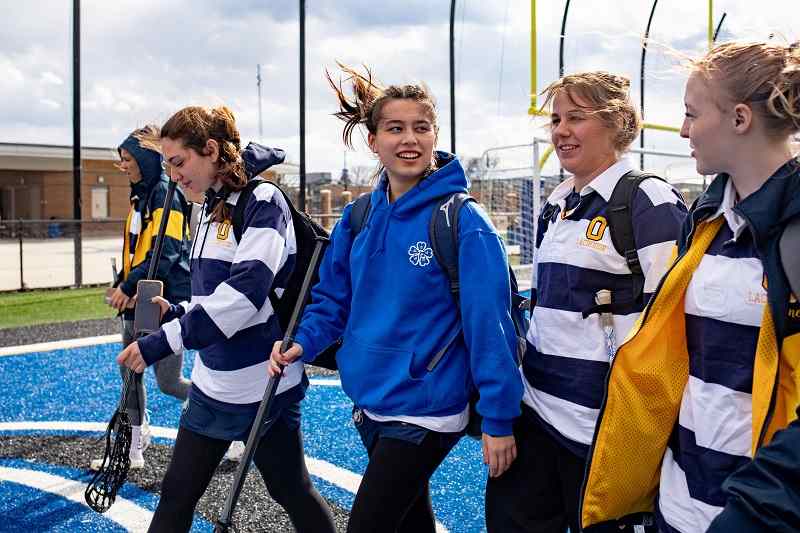
Reina St. Juliana, 16, and her teammates arrive for a game at Royal Oak High School in Royal Oak, Mich., on April 14. She and her sister, Hana, had planned to be on the team together.
The team had reserved a different jersey – No. 1 – for her sister, sliding it onto the back of a folding chair, where two bouquets of purple and yellow flowers rested.
Before the game began, a moment of silence was announced over the loudspeaker.
“Hana could not wait to start playing lacrosse with her best friends and sister,” a sports broadcaster said. “We all miss the radiance she brought to the world, both on and off the field.”
Reina dropped her head as the crowd went quiet.
In the bleachers, her parents, in long underwear and winter parkas, huddled against the rain under an umbrella. Hana might have been with them, Reina thought, if she hadn’t made the varsity team on her first try.
“I just kept thinking,” Reina said later, “about how it was the first – and not the last – game without Hana.”
Reina retied her gold cleats and snapped on her pink goggles. She tossed aside her winter gloves to better grip her lacrosse stick, hands numb with cold.
With each goal against Davison came the sound of cowbells. Her dad whooped as Reina scored twice. Her mom’s eyes filled with tears.
Then, in the last few minutes of the game, Reina darted down the field and lobbed the yellow ball into the other team’s net. She’d scored the final goal of the game – and a win for Oxford High.
But Hana hadn’t seen it.
Top Articles in News Services
-

Prudential Life Expected to Face Inspection over Fraud
-

Japan’s Nikkei Stock Average Touches 58,000 as Yen, Jgbs Rally on Election Fallout (UPDATE 1)
-

Hong Kong Ex-Publisher Jimmy Lai’s Sentence Raises International Outcry as China Defends It
-

Trump Names Former Federal Reserve Governor Warsh as the Next Fed Chair, Replacing Powell
-

Suzuki Overtakes Nissan as Japan’s Third‑Largest Automaker in 2025
JN ACCESS RANKING
-

Japan Institute to Use Domestic Commercial Optical Lattice Clock to Set Japan Standard Time
-

Israeli Ambassador to Japan Speaks about Japan’s Role in the Reconstruction of Gaza
-

Man Infected with Measles May Have Come in Contact with Many People in Tokyo, Went to Store, Restaurant Around When Symptoms Emerged
-

China Eyes Rare Earth Foothold in Malaysia to Maintain Dominance, Counter Japan, U.S.
-

Prudential Life Insurance Plans to Fully Compensate for Damages Caused by Fraudulent Actions Without Waiting for Third-Party Committee Review



